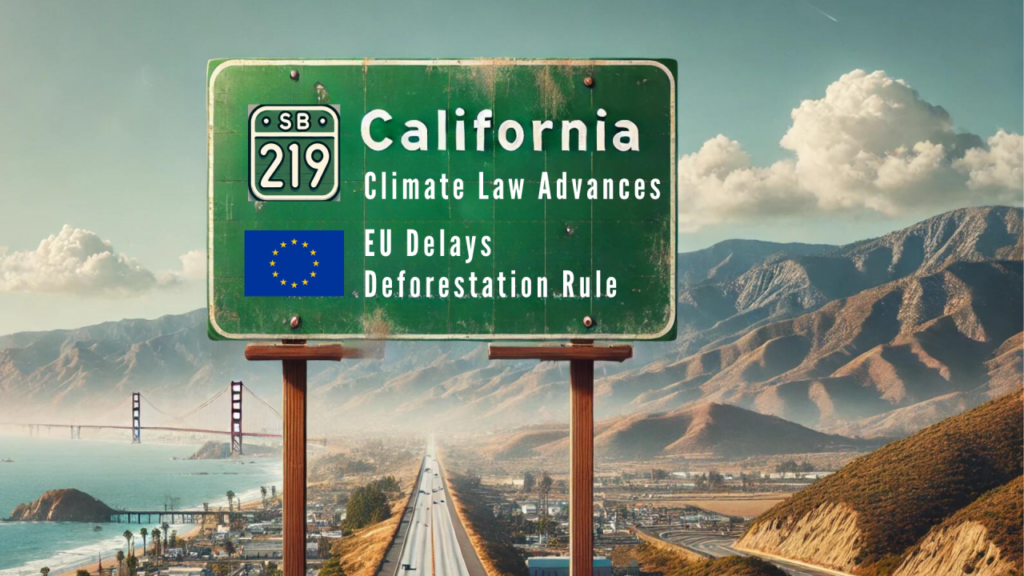Tim Mohin: California Climate Disclosure Law Advances, EU Delays Deforestation Rule

This week, the EU and the US seemed to swap roles as California advanced its climate disclosure law, maintaining the 2026 reporting deadline for large companies. On the other side of the role switch, the EU Commission proposed to delay its deforestation rule by a year.
California Governor Gavin Newsom signed SB 219 late last week – sending a signal to US companies that mandatory climate disclosures are likely regardless of what happens in the court battle over the Securities and Exchange Commission (SEC) climate rule.
As the state with the largest economy and population, California has long led the US and even the world in environmental action. Since 1967, when California created its Air Resources Board (CARB), the state’s strict air quality and vehicle emissions rules are the most stringent in the US and are often adopted nationally.
California’s climate disclosure rules could be another example of the state’s environmental leadership and become a framework for the nation. Already, four other states are considering similar legislation (New York, Illinois, Minnesota, and Washington).
The bill that Governor Newsom signed last week consolidated SB 253 and 261 – climate emissions and risk disclosure, respectively. The main changes in the consolidated bill were:
- C. RB has an extra six months, until July 1, 2025, to finalize the disclosure rules.
- To lower business expenses, the reporting fees in the original bills have been eliminated, and companies can combine reporting at the parent company level.
- Under the original policy, companies had 180 days to report Scope 3 emissions after submitting Scope 1 and 2 emissions data. Under the new law, CARB decides the timing for companies to report Scope 3 emissions.
But the big news here is that despite requests from the Governor to delay the reporting deadline (he even said the deadlines were “infeasible”), – the original timeline is maintained. US companies doing business in California that meet certain thresholds will have to report assured Scope 1 and 2 emissions and climate risks in 2026 and Scope 3 the year after per the CARB schedule. The only hurdle left for the California climate rules is a federal lawsuit, which starts in 2 weeks (October 16th).
EUDR Delayed

Pressure has been mounting over the last few months to delay the EU’s Deforestation Regulation (EUDR). The rule would block the import of certain products (e.g., cattle, soy, palm oil, coffee) linked to deforested land. However, the countries of origin for these products expressed concerns about the effectiveness of the tools and information to determine links to deforestation.
In response to the growing criticisms the EU Commission proposed to delay the EUDR by a year saying: “Given feedback received from international partners about their state of preparations, the commission proposes to give concerned parties additional time to prepare.”
The proposal gives large companies another year for compliance (December 30th, 2025), and smaller companies have until June 30th, 2026. The update to the law has to be ratified by member states and the EU Parliament before December 30th, but it’s likely to sail through. The EU Commission also issued additional guidance for EUDR containing 11 chapters of clarifications on how the EUDR will work and added 40 new FAQs.
While many were thankful for this delay, activists like Julian Oram of Mighty Earth, said the delay is “an act of nature vandalism that will serve only to drive more industrial destruction of tropical forests, threatening the people and wildlife who depend on them.”
Follow ESG News on LinkedIn












